#Spiritual Illumination
Explore tagged Tumblr posts
Text
Dark Nights, Bright Lights
The term dark night of the soul evokes images of struggle, confusion, and a seeming absence of light. Yet, this darkness can often serve as a powerful portal, guiding one to a level of spiritual illumination unreachable by any other path. Many consider it a crucible of transformation, an intense phase in which the familiar sense of self collapses, leaving one in a space of profound unknowing. Out…

View On WordPress
#awakening#Dark Night of the Soul#Inner Journey#self-inquiry#spiritual awakening#spiritual illumination#Spiritual Transformation#Surrender
3 notes
·
View notes
Text
"The Initiates of the Flame: Illuminating the Path to Esoteric Wisdom"
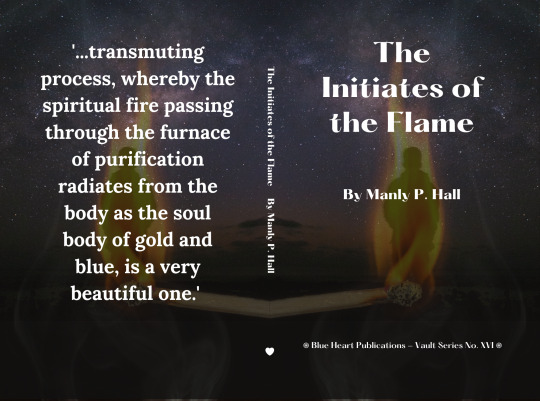
In "The Initiates of the Flame," Manly P. Hall takes readers on a captivating journey into the profound realms of esoteric knowledge and spiritual enlightenment. Hall's meticulous exploration of ancient mystical teachings serves as a beacon, guiding readers through the intricate tapestry of secret wisdom. With eloquence and depth, the author unravels the symbolic language of the initiates, revealing timeless truths that resonate with seekers of spiritual understanding.
Hall's narrative is a tapestry woven with threads of mystery, unveiling the sacred rites, hidden symbols, and spiritual allegories passed down through the ages. The book becomes a key unlocking the doors to higher consciousness, inviting readers to contemplate the esoteric principles that underpin the universe. As Hall delves into the teachings of the initiates, he sheds light on the transformative journey one must undertake to unlock the secrets of the flame—the eternal source of spiritual illumination.
The Initiates of the Flame is not merely a book; it is a profound meditation on the esoteric traditions that have shaped humanity's quest for spiritual enlightenment. Hall's insights are a testament to his deep understanding of the ancient mysteries, offering readers a glimpse into the hidden dimensions of existence. This work is a must-read for those who seek to unravel the mysteries of the flame and embark on a transformative journey toward higher knowledge and self-realization.
"The Initiates of the Flame," Manly P. Hall is available in Amazon in paperback 10.99$ and hardcover 18.99$ editions.
Number of pages: 167
Language: English
Rating: 9/10
Link of the book!
Review By: King's Cat
#Esoteric Wisdom#Spiritual Illumination#Ancient Mysteries#Initiatic Teachings#Hidden Symbols#Symbolic Language#Higher Consciousness#Spiritual Transformation#Sacred Rites#Mystical Traditions#Secret Knowledge#Spiritual Allegories#Metaphysical Exploration#Initiatory Journey#Universal Truths#Occult Wisdom#Hermetic Philosophy#Alchemical Insights#Transcendental Knowledge#Self-Realization
6 notes
·
View notes
Text

Artwork: A Byzantine style depiction of Magadha Sangmo meeting her guru, the Lord Buddha.
“The yellow robe represents the transmuted life energies which, radiating outward through the vital body, form around him a halo of golden light. There will never be a Christian too good to wear the yellow robe that the Buddha earned the right to wear, for the golden garment represents the aura of light which Christians paint around the heads and bodies of the saints, and the wedding raiment of which Saint Paul has spoken. We are all of us Princes of India, regardless of our nationality or creed. Each of us must some day give up the kingdoms of the earth, as the Lord Buddha did, to seek that eternal light which is the life of men.
Far down in the nature of the lower man, in those parts of his being which call eternally for comfort, for the gratification of desires, and for the happiness of the moment, is a kingdom over which in time each of us will renounce his rulership. We shall not give up our worldliness because we must, but because we shall discover there is something more important, more permanent, more desirable. Some day, like the young Prince, we shall realize the unhappiness and sorrow that is the fate of those who live in the lower worlds and the necessity of giving up these things and searching for the treasures which are eternal. Then we, too, shall cast off the royal robes of materiality and start our pilgrimage up the great mountains which lead to the homes of the adepts amidst the crags of the Himalayas. We, too, shall read the message of the lotus and, having seen the glory of its unfolded blossoms, recognize that we are but buds awaiting the time when we, too, shall blossom forth with the glory of awakened consciousness.
So in all climes and all countries Buddha, as yet unchristened by the great power of true spiritual illumination, seeks the answer to the problem of human consciousness. From one adept to another he goes amid the caves of Northern India, but his search is ever in vain, until finally within himself he finds the answer to the eternal problem of the ages. His own body, purified by prayer and meditation— which in this sphere of consciousness is service and daily mastery of problems—has become so ethereal that the golden light of the spirit within shines forth and he is robed in garments no king can buy.”
~ Manly P. Hall, The Noble Eightfold Path
#Manly P. Hall#The Noble Eightfold Path#Perennial Philosophy#Spiritual Illumination#Awakening#Enlightenment#Gnosis
0 notes
Text
"The Initiates of the Flame: Illuminating the Path to Esoteric Wisdom"
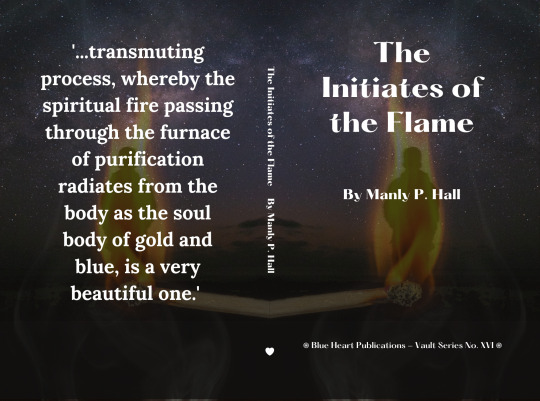
In "The Initiates of the Flame," Manly P. Hall takes readers on a captivating journey into the profound realms of esoteric knowledge and spiritual enlightenment. Hall's meticulous exploration of ancient mystical teachings serves as a beacon, guiding readers through the intricate tapestry of secret wisdom. With eloquence and depth, the author unravels the symbolic language of the initiates, revealing timeless truths that resonate with seekers of spiritual understanding.
Hall's narrative is a tapestry woven with threads of mystery, unveiling the sacred rites, hidden symbols, and spiritual allegories passed down through the ages. The book becomes a key unlocking the doors to higher consciousness, inviting readers to contemplate the esoteric principles that underpin the universe. As Hall delves into the teachings of the initiates, he sheds light on the transformative journey one must undertake to unlock the secrets of the flame—the eternal source of spiritual illumination.
The Initiates of the Flame is not merely a book; it is a profound meditation on the esoteric traditions that have shaped humanity's quest for spiritual enlightenment. Hall's insights are a testament to his deep understanding of the ancient mysteries, offering readers a glimpse into the hidden dimensions of existence. This work is a must-read for those who seek to unravel the mysteries of the flame and embark on a transformative journey toward higher knowledge and self-realization.
"The Initiates of the Flame," Manly P. Hall is available in Amazon in paperback 10.99$ and hardcover 18.99$ editions.
Number of pages: 167
Language: English
Rating: 9/10
Link of the book!
Review By: King's Cat
#Esoteric Wisdom#Spiritual Illumination#Ancient Mysteries#Initiatic Teachings#Hidden Symbols#Symbolic Language#Higher Consciousness#Spiritual Transformation#Sacred Rites#Mystical Traditions#Secret Knowledge#Spiritual Allegories#Metaphysical Exploration#Initiatory Journey#Universal Truths#Occult Wisdom#Hermetic Philosophy#Alchemical Insights#Transcendental Knowledge#Self-Realization
0 notes
Text
Mother Mary as the "Golden Candle and Censer"
In the name of God the Father, Christ Jesus His Son and the Holy Spirit, One True God. Amen Dear brothers and sisters in Christ Jesus As we journey together in this 15 Day Fast to commemorate and celebrate the Assumption of our beloved Theotokos, Mother Mary, it has been a great pleasure to learn and share with you the various symbolic inferences we draw from the Old Testament and give to the…
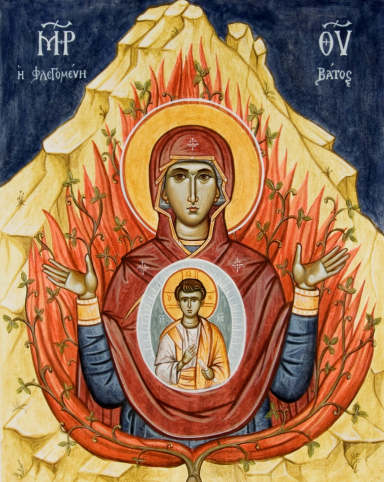
View On WordPress
#Christian devotion#Faith and guidance in Christianity#featured#Golden Candle and Censer symbolism#Intercession in Orthodox faith#Mary Theotokos#Mother Mary symbolism#Orthodox Christianity#Orthodox spirituality#Spiritual illumination#Theological meanings of symbols
0 notes
Text
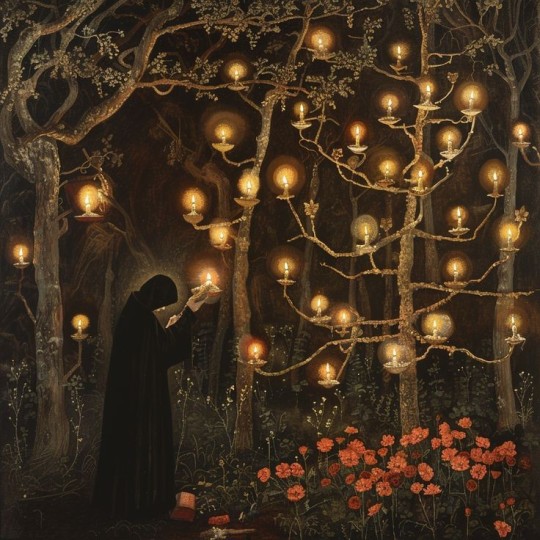
🕯️
#dark art#forest#illuminated#candles#soft light#darkness#spirite#afterlife#mystical#mysterious#beautiful#beauty#escape#pretty#art#spiritual#dark#nature#healing#flowers#trees#macabre art#night#pretty art#at night#glowing#artists
119 notes
·
View notes
Text
I do think you should understand that simply being outdoors and feeling the outdoors aren’t one in the same. You can stand outside and freeze your bones off and you won’t achieve anything, but also could stand outside in the freezing snow in nothing but a T-shirt and feel the cold like a running warmth around your mind - welcoming you to its home and taking you in as itself. there’s nothing inherently wrong with being unable to feel that second one at first, and you might even struggle to be able to find a way to tune into such a state, but it will come. Some time, some where. Even I at times don’t always get the desired effect! I can cry from the beauty of existing one moment then in 3 minutes complain about the biting chills. one moment - wether it be an hour or a second or a day, feel welcoming and happy— the other, indifferent and bored. And that’s all alright!
#Divine illumination#divine guidance#spiritual growth#spiritual awakening#spirituality#spiritual journey#meditation#reminder#pinned post
74 notes
·
View notes
Text

The Bardic Tradition
I made a long thread explaining in detail all the symbolism in this piece when I first posted it. That's lost to time now, thanks Elon. I'll try to rewrite it to the best of my ability in an abridged form.
The basic gist is that its a visual representation of the ancient Gaelic bardic tradition. Seated in the center is St. Colmcille, composing an old Irish hymn to St. Brigid, "Brigit bé bithmaith". He is holding hazel nuts, symbols of knowledge / inspiration in Irish legend. On the two pillars on either side of him are King David (left) and Orpheus (right), two famous poets from antiquity. Two legendary poets from Irish legend, Oisín and Amergin, are situated above each pillar respectively. The two fish are seen swimming "upstream" (as in the legend of the Salmon of Knowledge) toward a sheela na gig, a architectural feature / grotesque of early Irish churches which some consider to be symbols of femininity, meant to ward off evil. At the top of the image, hands from a cloud (representing God) release a white dove (representing the Holy Spirit) down to St. Brigid. She owes her angelic appearance to her being considered both a pagan goddess and Christian saint. She is guarding a flame, which symbolises poetic inspiration, and which can be seen floating above the heads of all the other figures.
#celtic#irish#poetry#celtic mythology#irish mythology#irish culture#ireland#celtic culture#celtic christianity#druidry#druidism#bardic inspiration#imbas#imbas forosnai#celtic revival#gaelic#st brigid#saint brigid#mythology#digital art#mediaeval#medieval art#medieval manuscripts#illuminated manuscript#celtic design#irish history#awen#esotericism#spirituality#paganism
109 notes
·
View notes
Text

#meditation#philosophy#spirituality#enlightenment#mindfulmeditation#mantra#advaita#illumination#mysticism#jesus christ#god#yahweh#father#gnostic christianity#orthodox christianity#christianity#catholic#prayer#unitarian#universalism
119 notes
·
View notes
Text

Soo the final client piece for for 2023 is complete! Another custom tarot card! For DraqueD on Twitter
#art#artists on tumblr#digitalart#medievalart#fantasy#tarot#tarot cards#occult#temperance tarot#temperance#spiritual#card#playing cards#digital art#medieval#medieval fantasy#fantasy art#illuminated manuscript#manuscript#beastiary#historic#historic art#gold#creature#oc#characterart#commissionart#artwork#art commissions#lunegrimmart
97 notes
·
View notes
Text

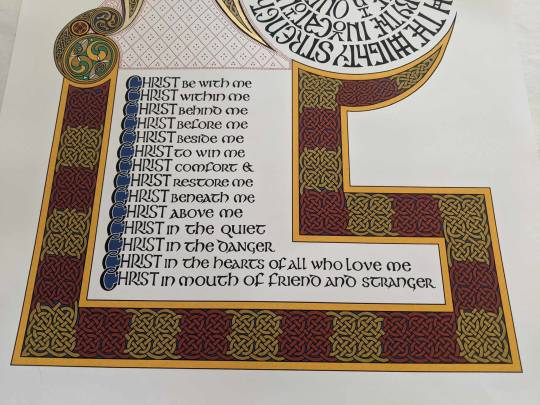
Some detail shots of the Lorica of St. Patrick. This is now available as a 16" x 20" print on the Tamburn Bindery Etsy shop: https://tamburnbindery.etsy.com
#medieval#calligraphy#illumination#celtic#celtic art#stpatrick#irish#prayer#binding#knotwork#medieval manuscripts#medieval art#spirituality
74 notes
·
View notes
Text
WELCOME, WELCOME !!
IN THIS BLOG, YOU MAY SEND ANY ASKS! ANONS ARE WELCOME! You should not be reminded of this but the only limitations is not being an asshole. Please, if you’ve come to spread hate and blind guidance among the masses, I will delete your entry without hesitation.
Please feel free to speak freely. You may hide your identity for whatever reason you so desire but your speech is welcome here. We can discuss anything, you can get something off your chest, ask for help/advice, share something that happened lately wether it be good or bad, inquire about life, talk about what you believe is important, yap about something you enjoy, vent, ask questions, ask for support, and overall speak your mind - whatever it supplies.
I will try my best to reply to each and every one of you, but please do not freak out should you not see your ask for a while, as contrary to what I lead you to believe - I am human. DO NOT EXPECT THE SAME LEVEL OF ATTENTION AS SOME OTHER POSTS GET - I will try make a substantial contribution to the conversation but I will not make essays upon essays for all questions, you must accept this..
And, personal preference, but you do not need to inquire about me. I will share my personal experiences should the situation arise such a need to allow people to not feel alone but my identity, gender, and overall personal life is near enough to the form of water - constantly flowing and changing, without a real concrete idea of why and where.
Why has this blog been created? Why, ofcourse, to help you! And help us. Me. I must write and you must have someone to talk to you, isn’t this a good win-win situation for you
Any touchy subjects regarding anything on the topic of religion, fundraising, war, and politics is not here welcome. I apologise if you really wanted to, but I’m not interested in supporting scams, trolls, and blatant harassment. I’m trying to cultivate a safe space here. Well, unless it’s a vague mention. Please do not use anonymity to make others feel bad about themselves or spread any propaganda no matter how much you’re convinced it’s true.
#ask me anything#ask me questions#ask me things#send asks#anon ask#asks open#advice#life advice#life tips#good advice#adulting#mental health#mental wellness#coping#mental health matters#spirituality#meditation#consciousness#spiritualgrowth#self awareness#mental health awareness#endo safe#pro endo#therianthropy#therian community#writers on tumblr#writerscommunity#writers and poets#writeblr#Divine illumination
11 notes
·
View notes
Text

Los Entering the Grave by William Blake
#william blake#art#poem#jerusalem#los#door#grave#orb#spiritual orb#sun#spiritual#illumination#symbolism#symbolist#esoteric#religion#religious#illuminated#illustration#portal#gate#gateway#christianity#mythology
133 notes
·
View notes
Text
*Chanelled Message*
🪽Day 1: What is your core value? Lead with that
At times in your life you'll be presented with the choice to go back to your old ways or stick to your new resolve. Often we fail to become the person we want to be because we lack clarity in our vision and certainty in our beliefs. In times of confusion, try to go inwards and find what your core value is. Mine is kindness. Try to lead with that core value, for others and more importantly for yourself. You might fail a hundred times, but on 101 time, you will find it in yourself to honour your own path. Always with love xx
Hopefully your day is graced with happiness and peace. If this message resonated consider liking, reblogging and following. If you want to book a private reading or tip me, please feel free to reach out. Every bit helps me grow this community and support myself!
See you around, sparkly soul 🤍
#chanelled message#lumii illuminations#tarot cards#tarot#tarot reading#tarotblr#witchblr#witch community#witchcraft#spirituality#guidance
10 notes
·
View notes
Text

Clear Signs You're Well On Your Way To A Spiritual Awakening...
One sure sign you're on the path to spiritual awakening is that you start to trust your connection with the source of life.
For instance, you start to notice yourself beginning to answer your own questions more and more, and thus begin that process of actively healing yourself.
You're now able to look at your experiences not through the eyes of pain, but through a neutral lens, and can use that acquired strength to teach, to mentor, to guide and even to heal others.
Through consistent discipline and introspection, you're now able to notice, examine, dissect, prune and purge some of your old, outmoded, or even limiting or toxic beliefs.
You're better able to manage stress. You now have healthy boundaries, not based on fear or judgement, but on integrity. You speak up, no longer censor or suppress your thoughts, feelings, and ideas.
You trust yourself more, enough to become your own role model and forge your own new, unique path.
Reflections, Our Journey to Balance
#our journey to balance#reflections#spiritual awakening#energetic frequency#peaceful warrior#spiritual practice#illumination of spirit#power#balance#dignity#grace#intuition#higher truth#spiritual truth#mental health#self awareness#conscious living#healing journey#healing process#self discovery#self healing#self love#awareness#inspiration#gratitude
5 notes
·
View notes
Text

Universal Jungle- Linda Westin; 2019
#photography#night photography#desert#stars#plants#cactus#illuminated#beautiful#beauty#escape#pretty#art#dark#spiritual#nature#nature photography#healing#calm#shooting stars#celestial#cosmic#cosmos#green#purple#earthy#2019#astral#artists#photogtaphers#linda westin
164 notes
·
View notes